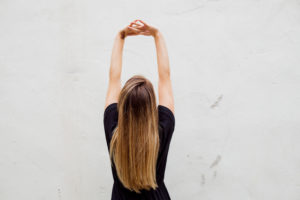by Erika Pranzo, LPC

“Fake it til you make it,” “sleep when you’re dead,” “power through it.”
Growing up in the competitive dance world, phrases like these were the only ones I knew. That’s why, when I first stepped onto a yoga mat in early adulthood, the instructor’s words struck me. “just being here is enough.”
Society often normalizes or even praises competitive attitudes. But criticism, comparison, and negative inner dialogue are some of the most common issues that accompany the two most common mental health disorders: anxiety and depression.
Yoga has a different perspective to offer.
The physical benefits of yoga, such as releasing mood-boosting hormones like serotonin and dopamine, are relatively well-known. But yoga has also been scientifically proven to nurture symptoms of depression, anxiety, and insomnia. And here’s how…
Establishing a regular yoga practice can teach you to be an observer. This is because it helps you learn to notice physical sensations and thoughts that come up without judging yourself. As a result, yoga helps build the self-awareness needed to notice when your body feels different, which can uncover early signs of anxiety, depression, or insomnia.
Enhancing your mind-body connection increases your ability to self-regulate.
By engaging your mind AND your body, and enhancing your mind-body connection, yoga increases your ability to self-regulate. This ultimately allows you to create a safe space for processing and healing, which is where the cognitive processing piece comes in!
Without the proper tools to help process stress, you may struggle with emotions or behaviors as a result, such as oversleeping, increased conflict with others, and social withdrawal, etc., which can impact your mental health. Yoga theory has allowed me to challenge my own limiting thoughts and beliefs, many of which I had held onto for over two decades.
I encourage others to learn healthy cognitive processing methods rooted in self-regulation, which can lead to better outcomes, such as learning to soothe your nervous system or practicing boundaries. If you’d like to receive updates about future yoga workshops, sign up here. We hope you’ll join us!
Erika is Therapy for Women’s Internship Coordinator, and specializes in movement therapy, body image, anxiety, and depression. To learn more about Erika, read her bio here.
Looking for a therapist or unsure where to begin? Get started on our booking page.